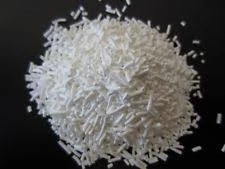
isopropyl
Understanding Isopropyl A Key Chemical Compound
Isopropyl, also known as isopropanol or 2-propanol, is a versatile and widely used chemical compound with the molecular formula C3H8O. It plays a significant role in both industrial and household applications, making it one of the most important alcohols in the chemical industry. This article delves into the properties, uses, and safety considerations associated with isopropyl.
Properties of Isopropyl
Isopropyl is a colorless, flammable liquid with a strong alcoholic odor. It has a boiling point of 82.5°C (180.5°F) and a melting point of -89°C (-128°F), which allows it to remain a liquid at room temperature. The compound is soluble in water, which is a crucial property that enhances its effectiveness in various cleaning and disinfecting applications.
Isopropyl is classified as a secondary alcohol since the hydroxyl (–OH) group is attached to a carbon atom that is connected to two other carbon atoms. This structure contributes to its chemical reactivity, allowing it to participate in various biochemical processes. Isopropyl can undergo oxidation to form acetone, a solvent widely used in the nail polish remover and the cosmetic industry.
Common Uses of Isopropyl
One of the most recognized applications of isopropyl is in the formulation of rubbing alcohol, typically containing around 70% isopropyl alcohol. Its antiseptic properties make it an effective disinfectant for skin and surfaces, helping to reduce the risk of infections. Hospitals and healthcare environments rely heavily on isopropyl for sanitizing instruments and cleaning hands.
In addition to its antiseptic uses, isopropyl serves as a powerful solvent in various industries. It effectively dissolves oils, greases, and resins, making it indispensable in the manufacturing of pharmaceuticals, cosmetics, and personal care products. The electronics industry uses isopropyl alcohol to clean circuit boards and other electronic components, as it evaporates quickly and leaves no residue.
isopropyl

Isopropyl also finds applications in the production of household cleaning products. Many surface cleaners, disinfectants, and sanitizing wipes contain isopropyl alcohol due to its efficacy against bacteria and viruses. Furthermore, it is often used in the automotive sector for cleaning and degreasing parts.
Safety Considerations
While isopropyl is incredibly useful, it is essential to recognize and understand its potential hazards. As a flammable liquid, isopropyl poses a fire risk, and safety measures should always be in place when handling it. It should be stored in a cool, well-ventilated area away from heat sources and open flames.
Exposure to isopropyl alcohol can also lead to health risks. Inhalation of vapors can cause respiratory issues and irritation of the eyes, nose, and throat. Prolonged skin contact can lead to dryness and irritation. Therefore, using personal protective equipment such as gloves and goggles while handling isopropyl is recommended.
Environmental Impact
Isopropyl is generally regarded as safe for the environment when used responsibly. However, improper disposal can lead to water contamination, so it is crucial to follow local guidelines for disposal. Additionally, its production and transportation carry environmental implications, primarily due to greenhouse gas emissions. As a result, industries are increasingly seeking sustainable practices to minimize the ecological footprint of isopropyl production.
Conclusion
Isopropyl, with its broad range of applications and essential role in sanitation and industrial practices, is a critical compound in modern society. Understanding its properties, uses, and safety precautions is vital for maximizing its benefits while minimizing potential hazards. As industries continue to innovate and focus on sustainability, isopropyl will undoubtedly remain a key player in both consumer products and industrial applications. By adhering to safety standards and using isopropyl responsibly, we can leverage its advantages while ensuring a safe environment for all.
-
Aluminum Hydroxide: Quality Gels & Dried Gel AntacidNewsAug.31,2025
-
Buy High-Quality Trichloroisocyanuric Acid for Sale | TCCA 90% SupplierNewsAug.30,2025
-
Pure Sodium Dichloroisocyanurate Dihydrate | Powerful DisinfectantNewsAug.29,2025
-
Industrial Chemicals: Quality & Purity for Every IndustryNewsAug.28,2025
-
Nitrile Rubber Honoring Strict Production StandardsNewsAug.22,2025
-
Aspartame Ingredients Honoring Food Safety ValuesNewsAug.22,2025
-
Fertilizer for Balanced Plant NutritionNewsAug.22,2025
Hebei Tenger Chemical Technology Co., Ltd. focuses on the chemical industry and is committed to the export service of chemical raw materials.
-

view more DiethanolisopropanolamineIn the ever-growing field of chemical solutions, diethanolisopropanolamine (DEIPA) stands out as a versatile and important compound. Due to its unique chemical structure and properties, DEIPA is of interest to various industries including construction, personal care, and agriculture. -

view more TriisopropanolamineTriisopropanolamine (TIPA) alkanol amine substance, is a kind of alcohol amine compound with amino and alcohol hydroxyl, and because of its molecules contains both amino and hydroxyl. -

view more Tetramethyl Thiuram DisulfideTetramethyl thiuram disulfide, also known as TMTD, is a white to light-yellow powder with a distinct sulfur-like odor. It is soluble in organic solvents such as benzene, acetone, and ethyl acetate, making it highly versatile for use in different formulations. TMTD is known for its excellent vulcanization acceleration properties, which makes it a key ingredient in the production of rubber products. Additionally, it acts as an effective fungicide and bactericide, making it valuable in agricultural applications. Its high purity and stability ensure consistent performance, making it a preferred choice for manufacturers across various industries.





